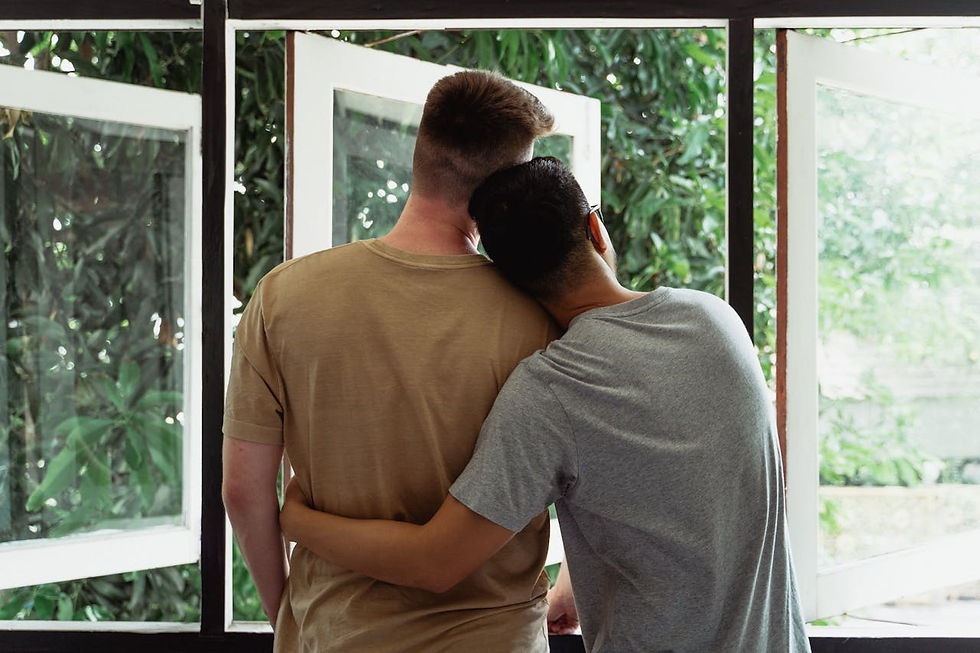How to Grieve Your Childhood as an LGBTQ+ Adult
- Will Dempsey

- Jul 22, 2024
- 3 min read
As someone who not only works with the LGBTQ+ community but is also a member of it, I’ve witnessed firsthand how people in our community carry grief over their childhood. Growing up with uncertainty or shame related to one’s identity or sexuality can be an isolating experience. In many cases, members of the LGBTQ+ community have to contend not only with trauma related to bullying or marginalization but also the specter of what might have been.
In today’s article, we’ll explore the importance of understanding the grief you might feel over your childhood and how you can begin healing.
Acknowledge Your Emotions

Grief is a natural process. It is the mechanism by which people make sense of major changes or events in their lives, as well as loss. We may feel the urge to push that grief down or bury it — we may even diminish or minimize our own pain. Ultimately, however, because grief is a process, it is only by giving those feelings a voice that we can learn to put them behind us. The best way to start is by asking yourself questions that might help you understand your grief:
Which aspects of your childhood were most painful?
How does your childhood experience impact your current relationships?
When did you first feel comfortable with being LGBTQ+?
How did being LGBTQ+ impact bonds with your family & friends?
What childhood experiences did you miss out on?
Embrace Your Inner Child
While your childhood may have passed, in many ways, that lost, lonely little kid is still alive inside you. Take a moment and imagine that child as you might see them through the eyes of your adult self. What advice would you give them? How would you have cared for them differently than their own family did?
We think of the past as something set in stone, but when we engage with our inner child, we have the ability to see ourselves in a new light. Your inner child deserves acceptance, compassion, and care; it’s not too late for you to give them those things.
Revisit Childhood Interests
In keeping with the idea of engaging your inner child, adulthood offers you a unique chance to revisit and re-make elements of your childhood. Allow your grieving process to include an exploration of the hobbies and activities you missed out on. Enjoy the new opportunities that being out and queer may offer you. In many cases, the milestones and achievements of your youth might feel hollow. Of course, that makes sense — how could you enjoy them if you weren’t allowed to experience them as your authentic self?
Boundaries & Expectations
It’s hard to grieve the past when you’re forced to relive it. Many members of the LGBTQ+ community may experience friction with family members who don’t understand their identity or sexuality. Even in light of past conflict, you may feel drawn to reconnect with people who have mistreated you in the past. When engaging with people who harmed you, take time to establish clear boundaries to ensure you are treated with respect. People may struggle with a change in pronouns or gender identity, but there’s a difference between slipping up and being willfully disrespectful.
Queer Community
When it comes to grieving for a lost childhood, it’s helpful to connect with others who understand your pain. Queer friendship and community offers the chance to engage with people who may feel similarly to you. Give yourself space to be vulnerable by opening up about your childhood. In turn, being that safe space for others may help you heal.
Schedule an Appointment
Are you struggling to make sense of your childhood? Do the emotions that it stirs up sometimes threaten to overwhelm you? Grief is a journey — but it isn’t one you have to undertake alone. Reach out today to schedule a free consultation for LGBTQIA+ therapy.




Comments